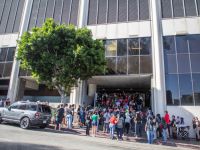By Ahmed Naser in Washington D.C.
Whether they were dressed in Sandals and torn jeans or a sweater and slacks, they traveled from all over the country to Washington DC to carry placards. They denounced World Bank and IMF policies as serving the ends of corporate America and multinationals by feeding corruption in developing nations and putting the environment at risk. They held hands to form a human barrier before the World Bank and IMF headquarters to bar officials from meeting.
But unlike the demonstrations in Seattle last year, shops were left intact and the Police kept their cool. Well almost, as Washington DC police chief Charles Ramsey stood there to calm the spirits on both sides. Ramsey and other police officials stood bargaining with the protestors on the most peaceful method to arrest them. And unlike Seattle, the local police bushwhacked the activists by shuttling the officials in through the back door in the early hours of Monday morning with the deliberations adjourning at 6:30 am.
The protests ended with fame for the activists. Of the 10,000 or more who gathered to protest, hundreds were arrested, while scores of others were beaten and showered not only with the early morning Washington rain but pepper gas, as they held hands to express their distrust and denounce the booming economy.
There is no question that globalization has been a very important ingredient to the current US economic situation of low inflation, rapid growth and lowest unemployment rate in a generation. That means that this economy has been doing very well, Catherine L. Mann, a senior fellow at the International Institute of Economics, a Washington-based think tank told albawaba.com.
But she warns what has not been the case is that not everybody in the economy has done as well as the aggregate.
The aggregate are not really keeping their mouths shut about it either. America's labor union, otherwise known as the AFL-CIO, found a voice amongst grassroots movements gathered here over the weekend to protest against World Bank and IMF capitalist strengthening policies.
"They used demonstrators for their purpose to get their message across," says Jordan Tanner, a five-term Utah House representative. "Many people are worried about China's entrance into the WTO and feel that many Americans may lose their jobs."
On the level of the labor union, though not many AFL-CIO members were visible in the protests that clogged Washington DC's streets till late Monday when the World Bank meetings came to an end, the labor union supported the event with food stalls and passing out protest placards.
Nevertheless, the representative and economist both agree that the protestors were voicing legitimate concerns shared by the majority of Americans.
"The protestors are not off on the left field, they are voicing concerns that have shown up as concerns for the majority of US citizens," says Mann.
"Yet do you look to the IMF, World Bank or WTO to solve the issue? The answer is no, the issue is one of domestic political agenda," she points out.
Tanner counters, "as you develop a free trading world, America has to learn that there are certain things that you shouldn't have to produce," due to their cheaper availability elsewhere. "I believe very strongly that the least amount of protectionism is the best, that we should open our markets as much as possible in every field."
Notwithstanding fears for America's labor, the issue that dominated the protestors' agenda was concern for the environment. And as income grows, so does awareness of the environment, notes Mann.
According to a poll conducted by the Gallup institute and aired on CNN, 16 percent participate in environmental protection efforts, 55 percent showed support for environmental issues and 80 percent recycle their trash.
From the grassroots side, "this goes to show you that what is good for the environment is good for the American laborer and the laborers of the world," counters 26-year-old Ocean Robbins founder and president of Youth for Environmental Sanity (YES!), one of the thousands of environmental groups that turned out.
"There are many, both young and old, who truly believe that there is corporate greed, that [corporations] are destroying the environment in rain forests in Brazil and in many ways using the environment to advance their own economic gains," points out Tanner.
Yet the protestors' concerns did not stop at environmental hazards. They question the legitimacy of aid to third world nations on the basis of whether or not the people of these nations should have to pay off loans pocketed by corrupt leaders.
"That has certainly happened, I am not going to deny that by any means, but not having any capital flow go to these countries surely leaves them worse off, countries that are cut off from international aid, surely are worse off," Mann justifies.
One protestor, Bodh Burgess, interviewed by albawaba.com during the protests expressed doubt on the principle of goodwill saying "the way that World Bank policies serve the ends of multi-nationals puts the question of philanthropy at stake."
"It is about the ability to make changes in the infrastructure so that northern countries have greater control of southern countries and allow them to exploit their human and natural resources," he adds.
But "there's no point in just putting in money, there has got to be a plan in place to actually see how that will affect the economy through industrial growth," Tanner says.
"If you say that a large corporation goes into a Third World country and it's able to buy cheap and start producing, at least they're producing jobs in that country, where that country might have never had jobs before," argues Tanner.
Regardless of this, protestors on the streets also had calms about the sovereignty of developing nations vis-à-vis World Bank and IMF policy.
"The IMF is run by corporate America," believes Jessica Simkoviz, a 20-year-old protestor and member of an NGO, who traveled from California, to attend the protests.
"[IMF and the World Bank policy] are an extension of imperialism -- western governments have moved out of the way to allow multinationals to walk in," Eden Luze, a college student with the group points out.
Simkoviz, Luze and Burgess were among the masses gathered here to protest policies, which they believe have burdened developing nations with high foreign debt and put the environment at risk, but on a more local level they share worries with the AFL-CIO that globalization threatens to wipe out the welfare of American laborers and their families.
Cover it well this time!
The World Bank and the IMF, meanwhile, were not the protestors' only faceless foe. They also had a bone to pick with the US media, which had snubbed them in the earlier protests in Seattle by not covering the demonstrations.
"Maybe its because we're all tools of corporate America," one TV journalist commented as he waited for the "action." This time round, the environmentalists gave some "action" and with it came nationwide and global coverage of the protests here.
Key to that was the way that alternative journalists mobilized in force to cover the event. As this reporter, waded through the torrent of demonstrators, what appeared as hobbyists with amateurish home cameras, in addition to full-fledged broadcast quality cameras, stood their ground to give an alternative account of the events. They wore no State Department approved press badges nor did they garnish themselves with emblems of major broadcasting corporations. But sure enough, they stood to interview, document and in some cases give live feeds of the event through cameras and cell phones.
But will the publicity pay off?
"One of the major things that you will see coming out of [the Washington] meetings will be a huge amount of discussion that they themselves have conducted on reform... and a lot of discussion on debt repayment and how they are going to look at the poorest of the poor countries," says Tanner.
The World Bank claims that it had already started embarking on the issues that protestors had been demonstrating against. Whether or not that is true, makes no real difference, according to most protestors.
What counts is that "big brother knows that we're all out there to watch them," one seasoned protestor, Joyce, says.
© 2000 Al Bawaba (www.albawaba.com)







